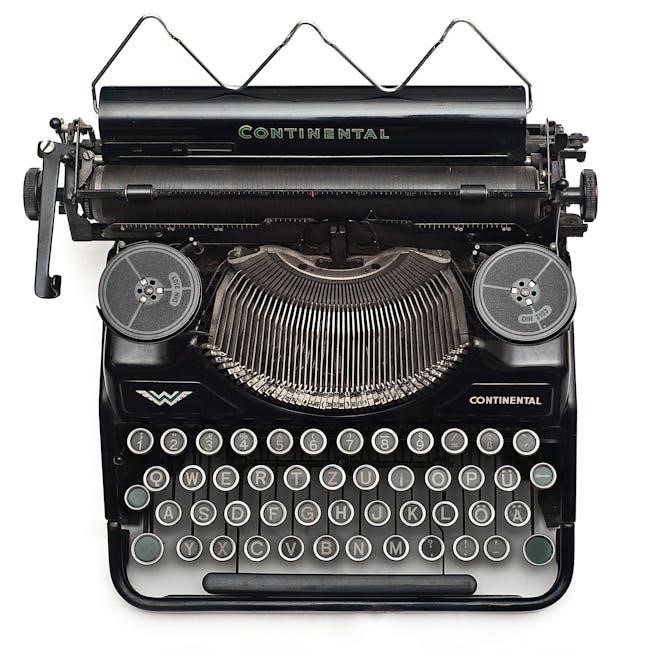The Colorado CDL Manual is a comprehensive guide for commercial drivers‚ detailing requirements‚ regulations‚ and best practices for obtaining and maintaining a Commercial Driver’s License (CDL) in Colorado. It provides essential information for both new and experienced drivers‚ covering state-specific rules and federal regulations to ensure safe and efficient commercial vehicle operations.
What is a CDL?
A Commercial Driver’s License (CDL) is a specialized driver’s license required to operate large or heavy vehicles‚ such as trucks‚ buses‚ and hazardous material carriers. In Colorado‚ a CDL is mandated for vehicles with a Gross Vehicle Weight Rating (GVWR) exceeding 26‚001 pounds or those designed to transport 16 or more passengers‚ including the driver. The CDL program ensures that drivers meet rigorous safety and skill standards to operate these vehicles responsibly. There are three primary classes of CDLs—Class A‚ B‚ and C—each corresponding to specific types of vehicles and operational requirements. Additionally‚ endorsements may be needed for specialized cargo or operations. The Colorado CDL Manual provides detailed guidance on these classifications‚ helping drivers understand which license type aligns with their career goals and legal obligations.
Importance of the Colorado CDL Manual
The Colorado CDL Manual is an indispensable resource for anyone seeking to obtain or maintain a Commercial Driver’s License (CDL) in the state. It serves as the official guide to understanding the rules‚ regulations‚ and requirements for commercial driving in Colorado. The manual provides detailed information on eligibility criteria‚ application processes‚ and testing procedures‚ ensuring drivers are fully prepared for both knowledge and skills exams. Additionally‚ it covers essential topics such as safe driving practices‚ vehicle inspection procedures‚ and hazardous materials handling. By adhering to the guidelines outlined in the manual‚ drivers can ensure compliance with state and federal regulations‚ reduce the risk of accidents‚ and maintain their CDL. The manual is regularly updated to reflect the latest changes in laws and industry standards‚ making it a crucial tool for both new and experienced drivers.
Overview of the Manual
The Colorado CDL Manual is structured to provide a clear and organized approach to understanding commercial driving requirements. It begins with an introduction to the CDL program‚ followed by detailed sections on eligibility‚ application processes‚ and types of licenses. The manual also covers essential topics such as road safety‚ vehicle inspections‚ and cargo securement. Each chapter is designed to address specific aspects of commercial driving‚ ensuring that drivers are well-informed and prepared for the responsibilities of operating a commercial vehicle. The manual is available both online and in printed form‚ making it accessible to all applicants. Regular updates ensure that the information remains current‚ reflecting any changes in state or federal regulations; This comprehensive guide is an essential resource for anyone seeking to obtain or renew a CDL in Colorado‚ ensuring they meet all necessary standards and requirements.

Eligibility Criteria for Obtaining a Colorado CDL
Obtaining a Colorado CDL requires meeting specific age‚ residency‚ and medical standards. Applicants must be at least 21 years old for interstate commerce and 18 for intrastate operations‚ pass a physical exam‚ and provide valid residency documents to qualify for the license.
Age Requirements
In Colorado‚ the minimum age to apply for a Commercial Driver’s License (CDL) is 18 years old for intrastate operations‚ while interstate commerce requires drivers to be at least 21 years old. This ensures that drivers meet both state and federal regulations. For intrastate drivers under 21‚ certain restrictions may apply‚ such as limitations on hauling hazardous materials or operating double/triple trailers. Prospective CDL holders must provide proof of age through a valid ID or birth certificate. Additionally‚ all applicants must pass a physical exam to meet federal medical standards. These age requirements are designed to ensure driver maturity and safety on the road. The Colorado CDL Manual outlines these criteria in detail to help applicants understand eligibility before starting the process.
Residency and Legal Requirements
To obtain a Colorado CDL‚ applicants must meet specific residency and legal criteria. They must be legal residents of Colorado and provide proof of residency‚ such as a utility bill‚ lease agreement‚ or valid Colorado driver’s license. Applicants must also hold a valid Social Security number and pass a background check‚ particularly for endorsements requiring higher security clearance‚ such as hazardous materials (H) or school bus (S) endorsements. Non-citizens must provide documentation of legal residency status. Colorado adheres to federal regulations‚ ensuring compliance with the REAL ID Act for CDL issuance. The Colorado CDL Manual details these requirements‚ emphasizing the importance of meeting all legal standards to operate commercial vehicles safely and legally within the state.
Medical Certification
Medical certification is a critical requirement for obtaining a Colorado CDL. Applicants must undergo a physical examination conducted by a Federal Motor Carrier Safety Administration (FMCSA)-certified medical examiner. The exam ensures that drivers meet federal health standards to operate commercial vehicles safely. Key aspects include vision‚ blood pressure‚ and physical ability to handle demanding tasks. Drivers must obtain a Medical Examiner’s Certificate‚ which is valid for up to two years‚ depending on health conditions. Certain medical conditions‚ such as diabetes or sleep apnea‚ may require additional documentation or restrictions. The Colorado CDL Manual outlines specific medical guidelines and disqualifying conditions‚ emphasizing the importance of maintaining physical fitness to ensure public safety on the road. Failure to meet these standards can result in eligibility denial or restrictions on CDL privileges.

The Application Process for a Colorado CDL
The application process for a Colorado CDL involves completing a CDL application‚ providing required documents‚ passing knowledge and skills tests‚ and paying applicable fees. Proper preparation and compliance with state regulations are essential to ensure a smooth process and obtain the license efficiently.
Steps to Apply
Applying for a Colorado CDL involves several structured steps to ensure compliance with state and federal regulations. First‚ applicants must verify their eligibility by meeting age‚ residency‚ and medical requirements. Next‚ they should complete and submit the CDL application form‚ which can be obtained from the Colorado DMV or downloaded online. Applicants must then provide required documents‚ such as proof of identity‚ residency‚ and legal status. Following document submission‚ applicants are required to pass a vision test and obtain a medical certification from a FMCSA-approved examiner. After that‚ they must pass the necessary knowledge tests for their desired CDL class and endorsements. Once the knowledge tests are passed‚ applicants can schedule a skills test‚ which includes a pre-trip inspection‚ basic vehicle control‚ and on-road driving evaluation. Finally‚ upon successful completion of all tests‚ applicants pay the applicable fees and receive their CDL. Proper preparation and adherence to these steps are crucial for a smooth application process.
Required Documents
To apply for a Colorado CDL‚ specific documents must be provided to verify identity‚ residency‚ and eligibility. Applicants need a valid U.S. birth certificate‚ valid U.S. passport‚ or other approved proof of identity. Proof of Colorado residency is required‚ such as a utility bill‚ lease agreement‚ or bank statement. A Social Security card or equivalent document‚ like a W-2 form‚ must also be submitted. Non-citizens must provide documentation of legal presence‚ such as a valid green card or visa. Additionally‚ applicants must present a valid Colorado driver’s license or a commercial learner’s permit. A completed CDL application form‚ available from the Colorado DMV‚ is also necessary. For medical certification‚ a valid DOT Medical Examiner’s Certificate must be submitted. Ensure all documents are original or certified copies‚ as photocopies may not be accepted. Double-checking these requirements beforehand can streamline the application process.
Fees and Payment Methods
Obtaining a Colorado CDL involves various fees‚ which may vary based on the type of license and endorsements. The application fee for a CDL is typically around $50‚ with additional costs for skills tests‚ endorsements‚ and other services. Endorsements‚ such as for hazardous materials or double/triple trailers‚ may add $10 to $50 each. Renewal fees are generally lower‚ around $35 to $50‚ depending on the license term. Payment can be made via cash‚ credit cards‚ checks‚ or money orders at Colorado DMV offices. Some third-party providers may charge additional fees for services like skills testing. It’s important to verify the exact fees and payment methods with the Colorado DMV before applying‚ as fees are subject to change. Ensuring payment is made with an accepted method will help avoid delays in the application process.

Types of CDL Licenses and Endorsements
The Colorado CDL Manual outlines three classes of licenses (A‚ B‚ C) and various endorsements (H‚ N‚ P‚ S‚ T) for specialized cargo and vehicles‚ enabling drivers to operate specific commercial vehicles safely and legally.
Class A‚ B‚ and C Licenses
A Class A CDL allows drivers to operate combination vehicles with a trailer‚ such as semi-trucks‚ requiring a minimum Gross Vehicle Weight Rating (GVWR) of 26‚001 pounds. Class B licenses cover heavy straight trucks like dump trucks and box trucks‚ also with a GVWR of 26‚001 pounds or more. Class C licenses are for smaller vehicles‚ including passenger buses and HazMat vehicles‚ with a GVWR below 26‚001 pounds but requiring specific endorsements. Each class is tailored to the type of vehicle and cargo‚ ensuring drivers are qualified for their specific role. Understanding these classifications is crucial for choosing the correct license type and completing the appropriate training and testing. This structure helps maintain safety and efficiency in commercial driving operations across Colorado.
Endorsements and Restrictions
Endorsements and restrictions on a Colorado CDL are critical for ensuring drivers are qualified to operate specific types of vehicles or carry certain cargo. Common endorsements include Hazardous Materials (H)‚ Tank Vehicles (N)‚ and Double/Triple Trailers (T)‚ each requiring additional knowledge and skills tests. Restrictions‚ such as “E” for automatic transmission-only operation‚ limit driving privileges based on individual qualifications. Drivers must apply for endorsements separately‚ often requiring background checks or specialized training. Restrictions are typically added if a driver cannot operate certain vehicles‚ such as manual transmissions or combination vehicles. Understanding and adhering to these endorsements and restrictions is vital for legal compliance and safety on the road. They ensure that drivers only operate vehicles they are trained and authorized to handle‚ maintaining safe and efficient commercial driving operations in Colorado.
Special Requirements for Certain Endorsements
Certain endorsements on a Colorado CDL require additional steps beyond standard testing. For example‚ the Hazardous Materials (H) endorsement demands a federal background check by the Transportation Security Administration (TSA). Applicants must submit fingerprints and pass a security screening before this endorsement is granted. Similarly‚ the Tank Vehicle (N) endorsement requires specific knowledge of safe liquid cargo handling‚ while the Double/Triple Trailers (T) endorsement involves demonstrating proficiency in managing longer vehicle combinations. Some endorsements also necessitate periodic recertification or ongoing training to maintain validity. These special requirements ensure that drivers are not only knowledgeable but also trustworthy and skilled in handling specialized cargo or vehicles‚ thereby enhancing road safety and regulatory compliance. Meeting these requirements is essential for obtaining and keeping such endorsements on a Colorado CDL.

Study Materials for the Colorado CDL Exam
The Colorado CDL Manual is the primary study material for exam preparation‚ offering detailed information on state-specific rules‚ federal regulations‚ and safe driving practices. It includes test-taking strategies and practice questions to help applicants succeed.
Overview of the Colorado CDL Manual
The Colorado CDL Manual is a detailed guide designed to help commercial driver’s license applicants prepare for their exams and understand state-specific regulations. It covers essential topics such as medical certification requirements‚ vehicle inspection procedures‚ and safe driving practices. The manual also outlines the different types of CDL licenses and endorsements‚ providing clear explanations of eligibility criteria and application processes. Additionally‚ it includes sections on road safety‚ traffic laws‚ and best practices for operating commercial vehicles. The manual is regularly updated to reflect current federal and state regulations‚ ensuring drivers have the most accurate and relevant information. Available in both print and digital formats‚ the Colorado CDL Manual serves as the primary resource for anyone seeking to obtain or renew a commercial driver’s license in the state.
Key Sections to Focus On
The Colorado CDL Manual contains several critical sections that are essential for successful exam preparation and safe driving practices. One key area is the Medical Certification Requirements‚ which outlines health standards for commercial drivers. Another important section is Vehicle Inspection Procedures‚ detailing pre- and post-trip checks to ensure safety. The Safe Driving Practices chapter provides tips for handling large vehicles‚ navigating hazardous conditions‚ and maintaining defensive driving techniques. Additionally‚ the manual emphasizes Traffic Laws and Regulations‚ covering specific rules for commercial vehicles in Colorado. The Endorsements and Restrictions section is also vital‚ explaining the additional qualifications needed for specialized cargo or vehicle types. Focusing on these areas ensures a thorough understanding of both state and federal requirements‚ helping drivers prepare effectively for their CDL exams and maintain compliance on the road.
Additional Study Resources
Beyond the Colorado CDL Manual‚ there are several additional study resources available to help prepare for the exam. Online practice tests are a valuable tool‚ offering simulations of the actual test format and content. The Colorado DMV website provides supplementary materials‚ including downloadable guides and checklists. Additionally‚ third-party websites offer detailed study guides and interactive learning aids tailored to Colorado-specific CDL requirements. Many resources include tips for effective study habits‚ such as focusing on key concepts and seeking feedback from instructors. These tools complement the manual‚ ensuring a comprehensive understanding of the material. By utilizing these resources‚ applicants can enhance their knowledge and confidence‚ leading to better exam performance and safe driving practices. Staying informed and leveraging these resources is crucial for success in obtaining a Colorado CDL.
The CDL Testing Process in Colorado
The Colorado CDL testing process includes both knowledge and skills tests‚ ensuring drivers meet federal and state standards. Proper preparation and practice are essential for success.
Knowledge Tests
The Colorado CDL knowledge tests assess a driver’s understanding of safe driving practices‚ traffic laws‚ and vehicle operation. The tests are multiple-choice and cover topics like road safety‚ vehicle inspection‚ and hazardous materials handling. Applicants must pass a general knowledge test and additional tests for their specific CDL class or endorsements; For example‚ those seeking a Class A license must pass a combination vehicles test. The tests are based on the Colorado CDL Manual‚ making it essential to study thoroughly. A minimum score of 80% is required to pass. Drivers can take practice tests online to prepare. The knowledge tests ensure drivers have the necessary knowledge to operate commercial vehicles safely and legally. Proper preparation is crucial for success‚ as failing the test requires waiting a certain period before retaking it.
Skills Tests
The Colorado CDL skills tests evaluate a driver’s ability to operate a commercial vehicle safely and competently. The test is divided into three sections: pre-trip inspection‚ basic vehicle control‚ and on-road driving. During the pre-trip inspection‚ drivers must identify and report any safety issues with the vehicle. The basic vehicle control test assesses skills like backing‚ turning‚ and maneuvering in a controlled environment. The on-road test requires drivers to demonstrate safe driving practices in real traffic conditions‚ such as lane changes‚ turns‚ and merging. Each section is scored based on adherence to safety protocols and driving laws. Drivers must pass all three sections to obtain their CDL. Proper practice and familiarity with the vehicle are essential for success. The skills tests ensure drivers can handle commercial vehicles confidently and safely in various scenarios.
Importance of Preparation and Practice
Preparation and practice are crucial for successfully obtaining a Colorado CDL. Thoroughly studying the Colorado CDL Manual ensures familiarity with state and federal regulations‚ driving laws‚ and safety standards. Regular practice helps build confidence and competence in handling commercial vehicles. Many drivers find it helpful to take practice tests to identify weak areas and focus their study efforts. Additionally‚ hands-on practice with a qualified instructor or experienced driver provides real-world experience‚ especially for the skills tests. Consistent review of the manual and ongoing practice reinforce knowledge retention and improve driving skills. Adequate preparation reduces the likelihood of failing the tests and ensures drivers are well-prepared for the responsibilities of operating a commercial vehicle safely and efficiently on the road.

Maintaining Your Colorado CDL
Maintaining your Colorado CDL involves regular renewal‚ adhering to medical certifications‚ and staying updated on regulations. Proper upkeep ensures continuous eligibility to operate commercial vehicles legally and safely.
Renewal Process
Renewing your Colorado CDL involves several steps to ensure compliance with state and federal regulations. Typically‚ you can renew your CDL up to 60 days before its expiration date. Start by submitting a completed application‚ which may require proof of residency‚ identity‚ and legal status; You’ll also need to provide a valid medical certification if applicable. Fees vary depending on the type of license and endorsements. Payments can be made via check‚ money order‚ or credit card. Renewal can be done in person at a Colorado DMV office or by mail if eligible. Additionally‚ some drivers may need to pass a vision test or provide updated medical documentation. It’s important to check for any state-specific requirements or updates before renewing. Proper renewal ensures uninterrupted commercial driving privileges and compliance with safety standards.
Disqualifications and Suspensions
Disqualifications and suspensions of a Colorado CDL can occur due to serious traffic violations or other offenses. These penalties aim to ensure public safety by removing unsafe drivers from the road. Common reasons include reckless driving‚ driving under the influence (DUI)‚ excessive speeding‚ and multiple traffic offenses. The duration of disqualification varies based on the severity of the offense‚ ranging from 60 days to lifetime bans for severe violations. Additionally‚ certain criminal convictions‚ such as those involving felony offenses or human trafficking‚ can lead to CDL disqualification. Drivers may also face penalties for violating out-of-service orders or operating a vehicle without proper medical certification. It’s crucial for CDL holders to understand these regulations to avoid losing their commercial driving privileges and to maintain their livelihood in the transportation industry. Regularly reviewing the Colorado CDL Manual helps drivers stay informed about disqualification criteria and suspension procedures.
Staying Informed About CDL Regulations
Staying informed about CDL regulations is crucial for maintaining compliance and ensuring a safe driving career. The Colorado CDL Manual is the primary resource for understanding state and federal rules. Regularly reviewing updates to the manual helps drivers stay aware of changes in laws‚ medical requirements‚ and endorsement criteria. Additionally‚ the Colorado Department of Motor Vehicles (DMV) provides notifications and updates through their website and driver alert programs. Drivers should also participate in training sessions or workshops offered by employers or regulatory agencies. By staying proactive and informed‚ CDL holders can avoid violations‚ ensure their license remains valid‚ and adapt to new industry standards. This proactive approach not only protects their career but also contributes to road safety and the efficient operation of commercial vehicles in Colorado.

